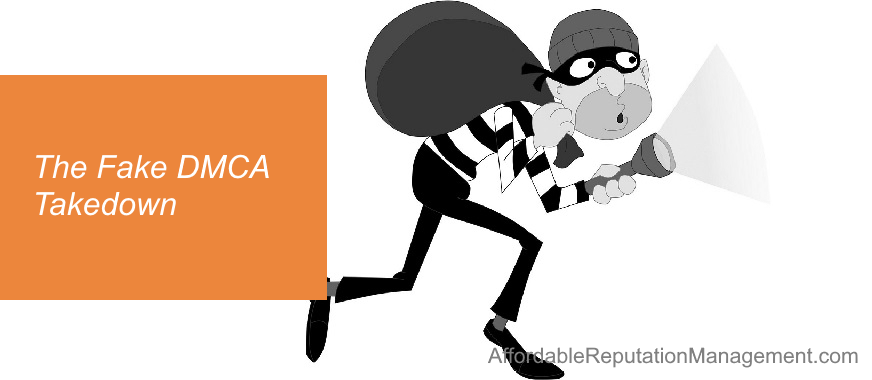A fake DMCA takedown (also known as the DMCA Scam) is a strategy employed by some shady online reputation management (ORM) companies to help you get an article or news story removed from Google’s search index. While the method can work temporarily, Google always finds out about it and three things happen:
- The negative article is re-indexed and ranks exactly where it did before in Google search results
- You lose whatever upfront fees you paid to the ORM agency
- You’re at risk for huge fines up to $100,000
Some unethical reputation management firms (especially those in India) may use this tactic, so be careful. Here’s more information on DMCA abuse.
How A Fake DMCA Request Works?
DMCA stands for Digital Millennium Copyright Act. It was passed by the United States Congress in 1998 to protect the intellectual property of internet publishers. It enables you to file a copyright claim for material that is yours that is illegally being used by someone else.
The DMCA Scam
The DMCA takedown “trick” works like this. First, you copy all or part of someone else’s content or intellectual property and publish it to a third party website you or someone else owns. You back date the content you publish on the 3rd party site in order to make it appear as if you are the originator of the content and own the copyright to it.
Then you file a DMCA request with Google stating that you are the original owner and that the other website or newspaper is using it illegally. In many cases, since Google receives so many requests, it will honor your request and automatically pull the article down. It removes the original page from its search index. When a page is removed from the search engine index, it no longer appears in Google search results.
At the same time, Google will notify the web hosting company informing them that one of their client’s websites has a copyright claim against them. The hosting company then notifies the webmaster on file for the site, letting them know they have a copyright claim. Since the claim is bogus, the webmaster will refute it. Google will then review the claim as a neutral party and side with the webmaster if, in fact, they find that the claim is false. At this point, the original article goes back on line.
This solution used to work, but doesn’t anymore. Although it can work as a temporary solution (2-4 weeks), false claims usually result in reversal and the original article winds up showing up in search results again.
The problem here is that shady ORM agencies will use it to offer you a no risk solution that they can get your negative article removed. They’ll guarantee removal and that you won’t have to pay anything until it’s gone. What they fail to tell you is the article is going to come back after a few weeks and you’re not going to get your money back. That’s the DMCA scam.
If the DMCA scam works, it’s illegal and only works temporarily. You’re also at risk of paying a huge fine, upwards of $100,000.
Further, the websites like webactivism.org and others like to publish stories about false DMCA claims, so you risk further negative stories appearing online, making your online reputation even worse than where it was when you started.
Example of How ORM Agencies File A False DMCA Takedown
Let’s say Tom Smith of Little Rock, Arkansas is a well known high school football coach. One night, he gets arrested for a DUI. An Arkansas Democrat-Gazette reporter writes a story and the editor publishes it online to ArkansasOnline.com on July 3rd. Now, when Tom Smith Googles himself, he sees the article on page 1 and it’s hurting his reputation where he lives and works. So, he contacts an online reputation management company to help him.
The ORM company copies and pastes the original ArkansasOnline.com to a third party website and dates the article July 1st. The website looks like a legitimate news site and since the article is posted two days prior to the “real” article, the stage is set for the false DMCA claim.
The agency files the claim with Google, citing an Intellectual property issue.
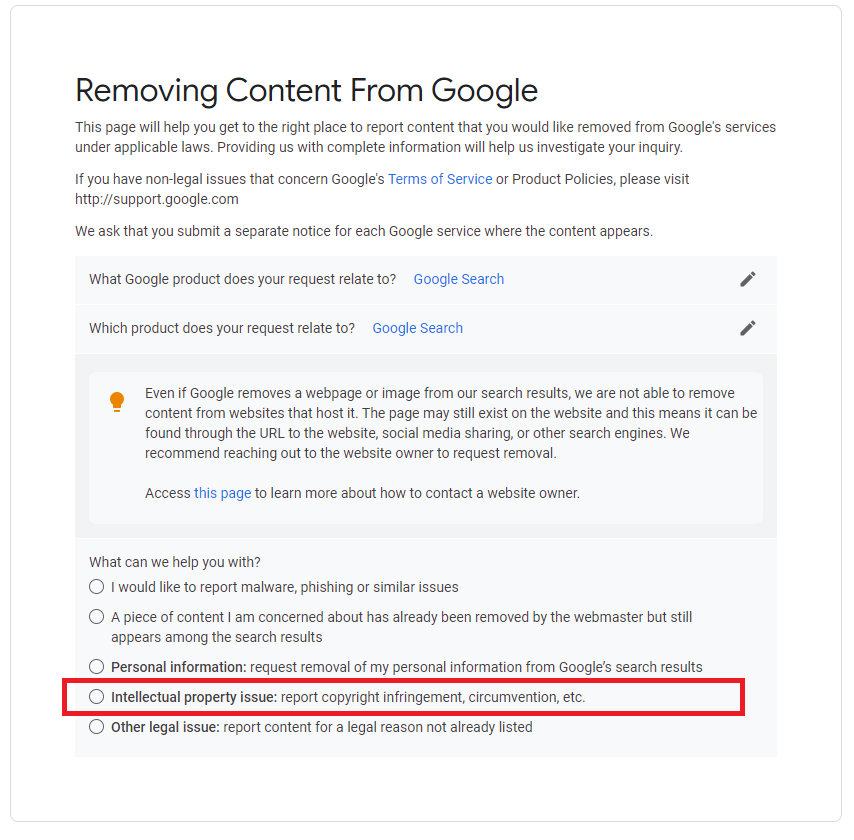
Next, “Copyright infringement” is selected stating that the original article at ArkansasOnline.com is copyrighted and being used illegally without authorization.
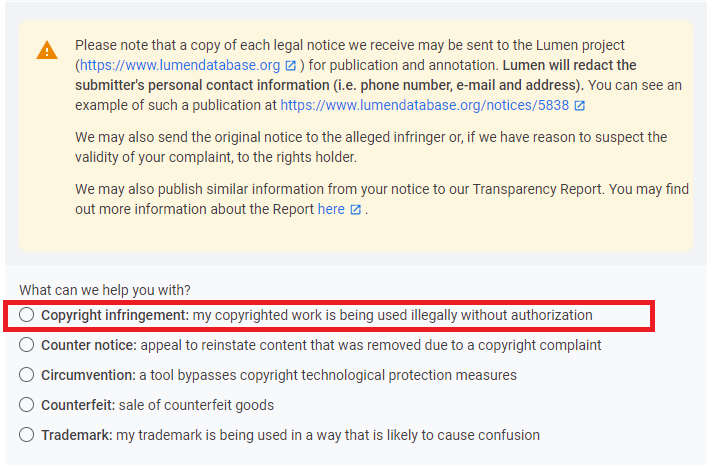
Finally, the agency will be led to file a lengthy form titled: Report alleged copyright infringement: Web Search. The full Google Copyright Removal form is found here.
This is a legal Infringement Notification which clearly states that this is serious business and that “misrepresentations made in your notice… [can result in penalties of]…$100,000 in costs and attorneys fees…”

Nonetheless, some nefarious ORM agencies (especially those who are not US-based) will proceed with the claim, providing a detailed false claim of copyright infringement. They will check boxes on the form swearing to its validity and submit it.
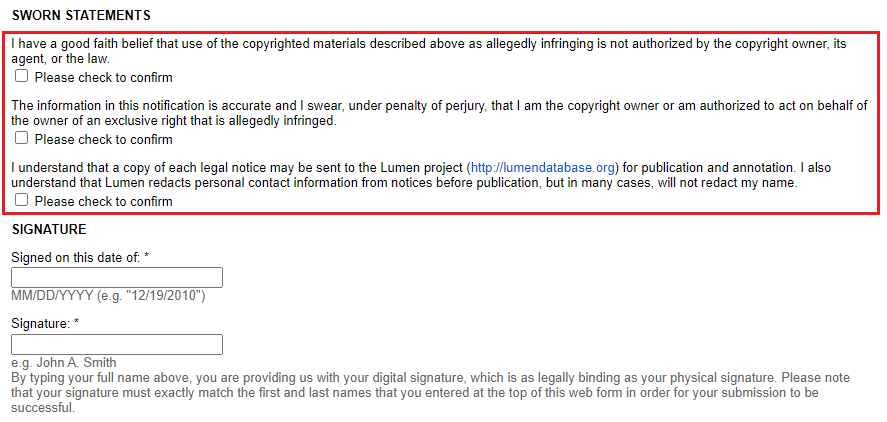
Since Google processes so many claims, they will often take down articles first and investigate later. If/when the article comes down, you make payment for the success and for a few weeks everything seems fine – Tom Smith’s search results are cleaned up.
Later, when the editor or webmaster of ArkansasOnline.com show Google that they originated the story, the “fake” story is discredited and the original article once again appears on page 1 for Tom Smith. He’s out the fees (good luck trying to get them back) and potentially at risk for hugh fines and attorney’s fees.
Further Complications of False DMCA Takedown
A copy of every DMCA request is reported to the Lumen Project which keeps a database of all claims filed. So, now you’ve got more bad press. As you can see, the risks are immense and the additional negative content that may appear online can make a bad situation even in worse.
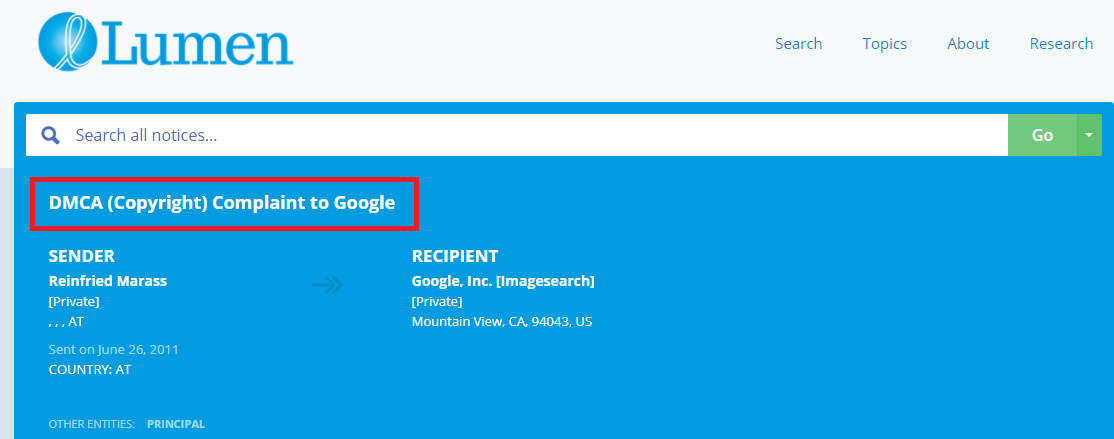
Example Of A Legitimate DMCA Takedown
Google processes millions of DMCA requests, most of which are legitimate. Here’s a hypothetical example of a legitimate DMCA takedown.
Let’s say you are the head of Marvel Studio, the creators of the Iron Man movie series. You find that someone has illegally obtained a clip of the movie, a trailer, a transcript or possibly the whole film. They’ve posted it on their own website for the purposes of generating traffic and possibly sales through advertisting income.
In this case, you would file a DMCA takedown requesting immediate removal of the copyrighted Iron Man material. This would cause the webpage to be removed from Google’s index (taken down) because it is clearly a copyright violation, as Marvel owns the rights to Iron Man.
This is just a single example of many requests Google is processing each month. Since Google is receiving so many DMCA requests, it’s easy to see how some of the false claims described above could slip through the cracks, yielding temporary results for those looking to improve their internet reputation.
How To Know A DMCA Claim Was Successful
Have you ever seen the message at the bottom of certain Google search results that says, “In response to a complaint we received under the US Digital Millenium Copyright Act, we have removed 1 result(s) from this page….”?
This is the message that appears when material has been removed from Google as result of a successful claim.

DMCA Takedown Scam Summary/Alternatives
You can see how the fake DMCA takedown scam is a temporary solution to your online reputation management issue at best.
At worst, you’ll likely be out thousands of dollars in fees paid to a shady ORM agency. Plus, you risk fines and further embarrassment as reports of the false claim appear online. And worst of all, the original news story or article is re-indexed, so you’re right back where you started.
It is nearly impossible to remove most content from the internet and that’s why we usually recommend suppression. Not only does suppression push down the negative web page, it can also help build up your online presence, so that any future unwanted articles don’t appear when you check your Google search results.
